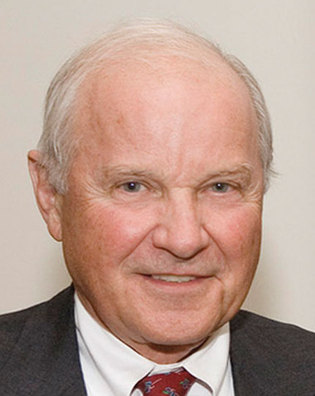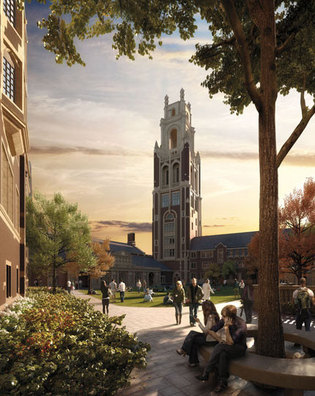 loading
loading
Light & Verity$250 million donation for college expansionCharles B. Johnson ’54 makes the largest single gift in Yale history.  Yale UniversityView full imageMore than six years after they were first proposed, Yale’s 13th and 14th residential colleges moved $250 million closer to reality in September with the announcement that Charles B. Johnson ’54 will give that amount—the largest single gift in Yale’s history—toward the college’s construction. In a message to the Yale community, President Peter Salovey ’86PhD said the donation puts the university within $80 million of the $500 million or so it needs to build the colleges. The new colleges, which would be built on a triangle of land along Prospect Street between the Grove Street Cemetery and Ingalls Rink, would allow Yale to expand its undergraduate enrollment by about 15 percent, from 5,200 to 6,000. The plan was approved by the Yale Corporation in June 2008 but was put on hold after the university’s endowment lost $5.9 billion in the economic collapse three months later.  Robert A.M. Stern ArchitectsView full imageSince then, the university has been trying to raise donations toward the construction of the colleges, using some early contributions to pay for their design (by the firm of School of Architecture dean Robert A. M. Stern ’65MArch), for the demolition of several buildings on the site, and for site preparation. In an early October update on campus construction projects, Provost Ben Polak said the university hopes to break ground on the colleges in February 2015 and complete them by August 2017. Johnson, the 80-year-old former Yale football player who gave the donation, recently retired as chair of Franklin Resources, a mutual-funds investment company founded by his father. He is also the principal owner of the San Francisco Giants, and, according to the most recent Forbes 400 list, he has a net worth of $5.6 billion. Johnson’s gift tops the previous record for a single donation to the university, set in 2005 when Stephen Adams ’59 and his wife Denise gave $100 million to the School of Music. In a Yale press release announcing the gift, Johnson said he hoped to inspire other alumni to give for the project. “Yale is unsurpassed in the quality of its undergraduate education, and I strongly support Rick Levin’s and Peter Salovey’s shared goal to make that extraordinary experience available to more students than ever before,” he said. “I hope my commitment will inspire other alumni, parents, and friends to complete the funding for the construction of these colleges.” Johnson’s past gifts to Yale have helped fund the renovation of the Yale Bowl; the construction of Johnson Field, a field hockey venue; the Brady-Johnson Program in Grand Strategy; and the Johnson Center for the Study of American Diplomacy, which acquired the papers of Henry Kissinger in 2011. But unless the university changes its policy, there won’t be a Johnson College at Yale. Although courtyards, libraries, towers, or dining halls in the new colleges may end up bearing donors’ names, the university has long said that the colleges themselves will follow the pattern of the existing ones, which are all named for people and places from Yale’s history.
The comment period has expired.
|
|